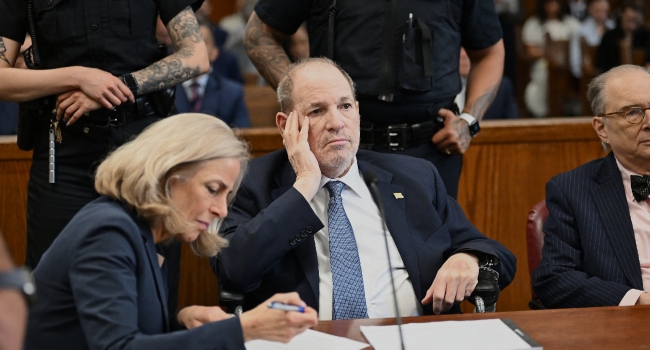Weinstein’s lawyer Arthur Aidala had forcefully argued that a crime had been committed against one of the jurors, but the judge dismissed the claim.
The judge in the Harvey Weinstein sex crimes retrial declared a mistrial on the outstanding rape charge against the movie producer Thursday, after the jury foreperson refused to return to deliberate the case amid a jury room feud.
In front of packed press and public benches in the 13th-floor New York courtroom, Judge Curtis Farber dismissed jurors who had been unable to reach a verdict on the charge that Weinstein raped Jessica Mann.
“Deliberations became heated to such a degree I am obligated to declare a mistrial on the one count on which you didn’t reach a verdict,” Farber declared from the wood-paneled bench, wearing a robe and reading glasses.
Weinstein’s lawyer Arthur Aidala had forcefully argued that a crime had been committed against one of the jurors, but the judge dismissed the claim.
On Wednesday, the jury convicted Weinstein for sexual assault on Miriam Haley, and acquitted the fallen movie mogul for allegedly sexually assaulting Kaja Sokola. The defense vowed to appeal.
The prosecutor brushed off the defense’s claim that a retrial on the charge of raping Mann would exert unfair pressure on the alleged victim. “We will proceed to trial and that is what justice would be in this case,” Nicole Blumberg said.
Outside court, Aidala alleged that two jurors had indicated to his team that the panel had considered the cases of rapper Sean “P Diddy” Combs and convicted child sex abuser R. Kelly in their discussions.
“(If) they say, ‘Well, look at R Kelly. Look what’s going on across the street with P Diddy’… That’s not what you can do, and that’s what we just heard happen,” said the sharp-suited attorney.
Combs is on trial at a nearby courthouse for alleged racketeering and other crimes, and the publicity of that case has largely eclipsed Weinstein’s retrial.
Weinstein, 73 and wheelchair-bound by ill-health, is already in jail for a 16-year term after he was convicted in a separate California case of raping a European actress more than a decade ago.
Proceedings in New York have been dogged by personal issues between jurors, two of whom have privately complained to the judge about fellow panelists.
The foreman had told judge Farber he could not continue after facing threats.
“One other juror made comments to the effect ‘I’ll meet you outside one day’,” the judge said Wednesday quoting the foreman, adding there was yelling between jurors.
After Weinstein’s lawyer demanded a mistrial over the jury rupture, Weinstein himself addressed the court Wednesday, deploying a commanding voice reminiscent of his Hollywood heyday.
‘Threats, violence, intimidation’
“We’ve heard threats, violence, intimidation — this is not right for me… the person who is on trial here,” he said.
The Oscar-winner’s conviction on the Haley charge is a vindication for Haley whose complaint in part led to the initial guilty verdict in 2020.
That landmark case helped spur the “MeToo” movement that saw an outpouring of allegations from prominent women who were abused by men.
Weinstein underwent a spectacular fall from his position at the top of the world of Hollywood and show business in 2017 when allegations against him exploded into public.
The movement upended the film industry, exposing systemic exploitation of young women seeking to work in entertainment, and provoking a reckoning on how to end the toxic culture.
More than 80 women accused Weinstein of sexual misconduct in the wake of the global backlash against men abusing positions of power.
Weinstein’s original 2020 conviction, and the resulting 23-year prison term, was thrown out last year after an appeals court found irregularities in the way witnesses were presented.

